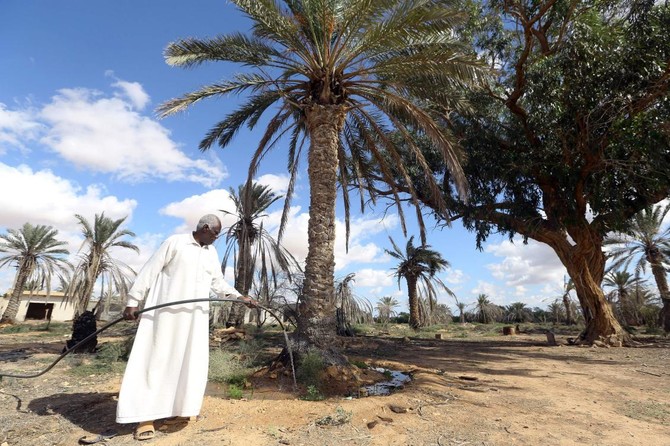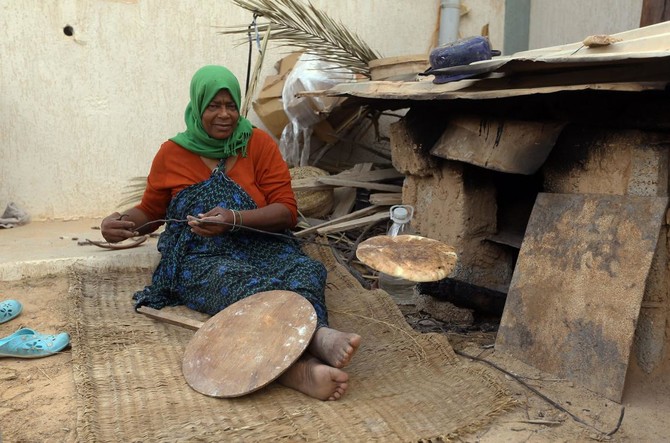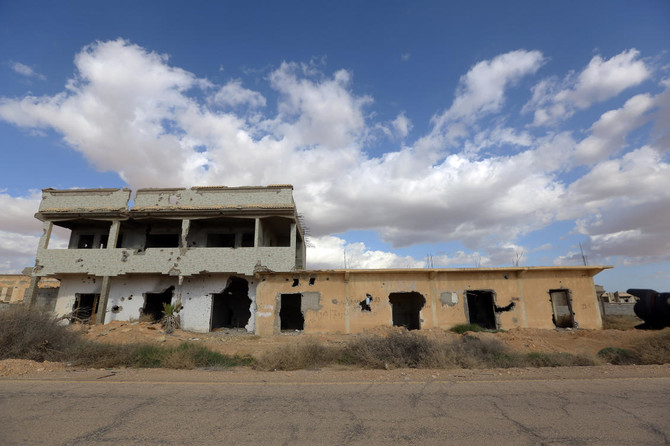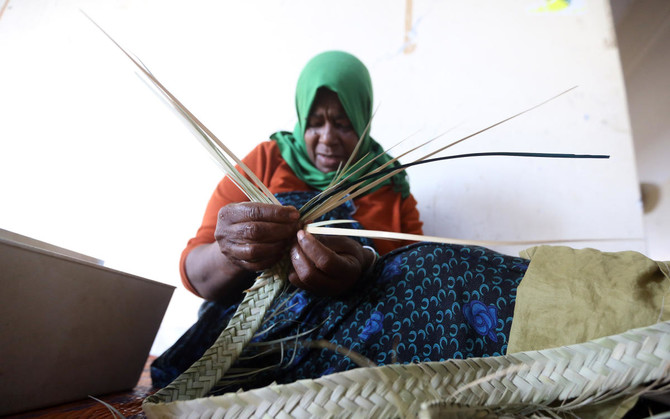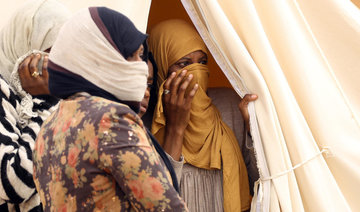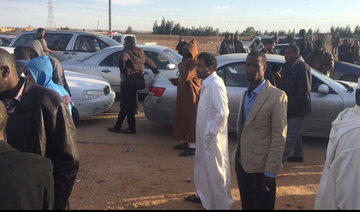TAWERGHA, Libya: Returning home after seven years in a camp for displaced people, Mahmoud Abou Al-Habel’s joy was eclipsed by pain when he surveyed his vandalized property in the Libyan town of Tawergha.
A burned out car, blackened date palms and damaged brickwork testify to the hostility that forced him and 26 family members to the relative safety of Tripoli’s outskirts, 240 kilometers (150 miles) away.
“I had planted 184 date palms — but most of them were burned, like my 150 pomegranate trees and 28 olive trees,” Habel said.
“It is heartbreaking to see them, because I planted them myself,” he told AFP, as he watered surviving palms via a pump with power from a generator.
Habel and 40,000 fellow residents of Tawergha and its surroundings were banished because they were seen as supporting former dictator Muammar Qaddafi right up to his bloody 2011 demise.
After being chased away by militia from the nearby city of Misrata, the displaced townsfolk were forbidden from returning home, until a reconciliation deal brokered in June by the internationally-recognized Government of National Accord (GNA).
Over the last four months or so, a few residents have trickled back.
The town’s alleyways remain littered with debris, while long-abandoned animals wander unimpeded.
Homes are either burned-out shells, or vandalized, but life has slowly begun to restart.
Five families whose homes are beyond repair have returned to eke out a living in the grounds of a former school.
Among them is Salma Khalil, a widow who provides for her children by weaving palm leaves into baskets.
“I have had to learn this trade” after losing so much, she said.
Khalil cooks bread in an earthen oven that she built in the corner of the school.
“I must support my girls, without their father, so I make the bread for us and I sell the rest,” she explained.
Schools and other public buildings have also been severely damaged or completely destroyed.
Salma wants the children to return to school and impatiently awaits a new clinic, because the nearest field hospital is unreachable for patients without transport.
Under the terms of the reconciliation agreement, the GNA has committed to compensating displaced families.
Tawergha’s municipal council has temporarily set up shop in one of the few schools spared by the conflict, where it addresses residents’ grievances.
Despite the challenges, mayor Abdelrahman Chakchak is upbeat.
“We are finally home and life is gradually reviving — the electricity is back, we have a school... and a field hospital,” he said.
Five offices have been established to evaluate and record damage, but residents can already start to rebuild their homes, Chakchak said.
But others are less optimistic.
“The government has not respected its promises to the residents of Tawergha,” said Amal Barka, president of the Producer Family, an NGO.
And the GNA itself acknowledges that much still needs to be done.
The town needs “significant financing to reconstruct itself, but also support from the international community, which has promised to contribute,” said Youssef Jalala, minister for the displaced and refugees.
“Tawergha must be rebuilt... because the return of residents remains timid. But they are coming,” he told AFP.
Returnees count cost of destruction in Libya’s Tawergha
Returnees count cost of destruction in Libya’s Tawergha

- 40,000 residents of Tawergha and its surroundings were banished because they were seen as supporting former dictator Muammar Qaddafi right up to his bloody 2011 demise
- After being chased away by militia from the nearby city of Misrata, the displaced townsfolk were forbidden from returning home, until a reconciliation deal brokered in June
Biden spoke with Netanyahu, source says; Sullivan says hostage deal very close

- Biden’s national security adviser Jake Sullivan told CNN’s “State of the Union” program earlier on Sunday that the parties were “very, very close” to reaching a deal
WASHINGTON: US President Joe Biden spoke on Sunday with Israeli Prime Minister Benjamin Netanyahu, a source familiar with the matter said, as US officials race to reach a Gaza hostage and ceasefire deal before Biden leaves office on Jan. 20.
Biden and Netanyahu discussed efforts under way to reach a deal to halt the fighting in the Palestinian enclave and free the remaining 98 hostages held there, the source said.
Biden’s national security adviser Jake Sullivan told CNN’s “State of the Union” program earlier on Sunday that the parties were “very, very close” to reaching a deal, but still had to get it across the finish line.
He said Biden was getting daily updates on the talks in Doha, where Israeli and Palestinian officials have said since Thursday that some progress has been made in the indirect talks between Israel and militant group Hamas.
“We are still determined to use every day we have in office to get this done,” Sullivan said, “and we are not, by any stretch of imagination, setting this aside.”
He said there was still a chance to reach an agreement before Biden leaves office, but that it was also possible “Hamas, in particular, remains intransigent.”
Israel launched its assault in Gaza after Hamas fighters stormed across its borders in October 2023, killing 1,200 people and taking more than 250 hostages, according to Israeli tallies.
Since then, more than 46,000 people have been killed in Gaza, according to Palestinian health officials, with much of the enclave laid to waste and gripped by a humanitarian crisis, and most of its population displaced.
Vice President-elect JD Vance told the “Fox News Sunday” program in an interview taped on Saturday that he expects a deal for the release of US hostages in the Middle East to be announced in the final days of the Biden administration, maybe in the last day or two.
President-elect Donald Trump, a staunch supporter of Israel, has strongly backed Netanyahu’s goal of destroying Hamas. He has promised to bring peace to the Middle East, but has not said how he would accomplish that.
Israel to use withheld Palestinian tax income to pay debt to state-run electric company

- Israel withheld Palestinian Authority's sums earmarked for administration expenses in the Gaza Strip since Oct. 7, 2023
JERUSALEM: Israel plans to use tax revenue it collects on behalf of the Palestinian Authority to pay the PA’s nearly 2 billion shekel ($544 million) debt to state-run Israel Electric Co. (IEC), the far-right Finance Minister Bezalel Smotrich said on Sunday.
Israel collects tax on goods that pass through Israel into the occupied West Bank on behalf of the PA and transfers the revenue to Ramallah under a longstanding arrangement between the two sides.
Since the Hamas-led attack on Israel on Oct. 7, 2023, Smotrich has withheld sums earmarked for administration expenses in the Gaza Strip.
Those frozen funds are held in Norway and, he said at Sunday’s cabinet meeting, would instead be used to pay debt owed to the IEC of 1.9 billion shekels.
“The procedure was implemented after several anti-Israeli actions and included Norway’s unilateral recognition of a Palestinian state,” Smotrich told cabinet ministers.
“The PA’s debt to IEC resulted in high loans and interest rates, as well as damage to IEC’s credit, which were ultimately rolled over to the citizens of Israel.”
The ultranationalist Smotrich has been opposed to sending funds to the PA, which uses the money to pay public sector wages.
Israel also deducts funds equal to the total amount of so-called martyr payments, which the PA pays to families of militants and civilians killed or imprisoned by Israeli authorities.
UAE ship delivers 3,000 tonnes of relief supplies to Lebanon

- Items include food, essentials for women and children, winter necessities
LONDON: The second aid ship from the UAE arrived at Beirut port on Sunday, carrying 3,000 tonnes of relief supplies as part of the UAE Stands with Lebanon campaign.
The UAE launched its campaign to support Lebanon last October as Israel’s war with the Iran-backed Hezbollah escalated in the south of the country.
Nasser Yassin, Lebanon’s environment minister and head of the government’s emergency committee, and Brig. Gen. Bassem Nabulsi, the chairman of the Supreme Relief Authority, received the ship at Beirut port.
Supplies included food, essentials for women and children, winter necessities, and shelter equipment, the Emirates News Agency reported.
Sultan Mohammed Al-Shamsi, the vice chairman of the UAE Aid Agency, said that the UAE’s moral obligation to support the Lebanese people “stems from the humanitarian legacy of the late Sheikh Zayed bin Sultan Al-Nahyan, who dedicated himself to helping nations in need.”
The UAE announced its plan to reopen the embassy in Beirut following a phone call between the newly elected Lebanese President Joseph Aoun and the UAE’s President Sheikh Mohamed bin Zayed Al-Nahyan, on Saturday.
The leadership in Saudi Arabia welcomed the election of Aoun after a two-year political void in Lebanon. Riyadh has dedicated efforts to help the Lebanese people cope with the devastation caused by the Israeli war and has dispatched several aid planes since 2024.
King of Jordan meets Vatican secretary of state in Amman

- Cardinal Pietro Parolin was in Jordan for the inauguration of the Church of John the Baptist
- King Abdullah praises Pope Francis’s support for Palestinians in the Gaza Strip
LONDON: King Abdullah of Jordan welcomed Cardinal Pietro Parolin, the Vatican secretary of state, at Al-Husseiniya Palace in Amman on Sunday.
King Abdullah sent his greetings to Pope Francis during a meeting attended by several senior royal advisers and aides. Cardinal Parolin thanked King Abdullah for his support and patronage of the Christian communities in Jordan.
The Jordanian king praised the pope’s support for Palestinians in the Gaza Strip, who since late 2023 have suffered the effects of an Israeli military campaign.
They agreed on the need to stop Israel’s war on the Gaza Strip, and increase the flow of humanitarian aid. They also warned of aggressive Israeli policies in occupied East Jerusalem and its effect on the Islamic and Christian holy sites, the Petra news agency reported.
Parolin on Friday attended the inauguration of the Church of John the Baptist on the east bank of the Jordan River.
15 killed in an explosion and fire at a gas station in central Yemen

- At least 67 others were injured, including 40 in critical condition
- Footage circulated online showing a massive fire that sent columns of smoke into the sky and left vehicles charred and burning
CAIRO: An explosion at a gas station triggered a massive fire in central Yemen, killing at least 15 people, health officials said Sunday.
The explosion occurred Saturday at the Zaher district in the province of Bayda, the Houthi-run Health Ministry said in a statement. At least 67 others were injured, including 40 in critical condition.
The ministry said rescue teams were searching for those reported missing. It wasn’t immediately clear what caused the explosion.
Footage circulated online showing a massive fire that sent columns of smoke into the sky and left vehicles charred and burning.
Bayda is controlled by the Houthis, who have been at war with Yemen’s internationally recognized government for more than a decade.
Elsewhere in Bayda, the Houthis attacked and looted Hanaka Al-Masoud village in the Al-Qurayshiya district last week, according to the internationally recognized government. It said there were fatalities but gave no figures.
Information Minister Moammar Al-Eryani said the attack came after a weeklong siege of the village.
“This horrific attack targeted citizens’ homes and mosques, and resulted in many casualties, including women and children, and the destruction of property,” he said.
Rights activist Riyadh Al-Dubai said the Houthis detained dozens of men and looted homes, seizing valuables such as gold, money, daggers and other possessions. He said shelling by the Houthis had continued relentlessly day and night for more than five days.
The US Embassy in Yemen condemned the attack, saying in a statement that the “deaths, injuries, and wrongful detentions of innocent Yemenis perpetrated by Houthi terrorists are depriving the Yemeni people of peace and a brighter future.”
Yemen’s civil war began in 2014, when the Houthis took control of the capital, Sanaa, and much of the country’s north, forcing the government to flee to the south, then to Saudi Arabia.
The war has killed more than 150,000 people including civilians and combatants, and in recent years deteriorated largely into a stalemate and caused one of the world’s worst humanitarian crises.



